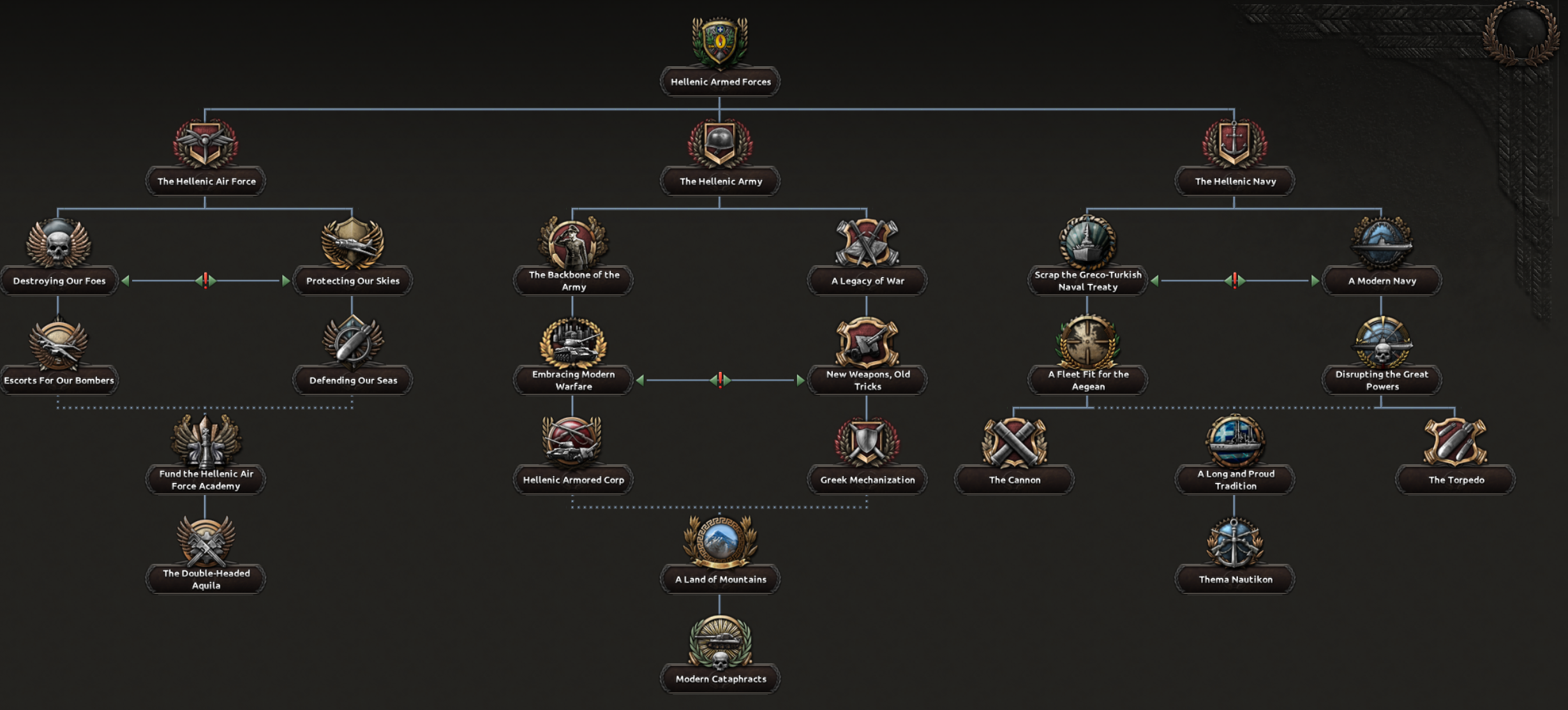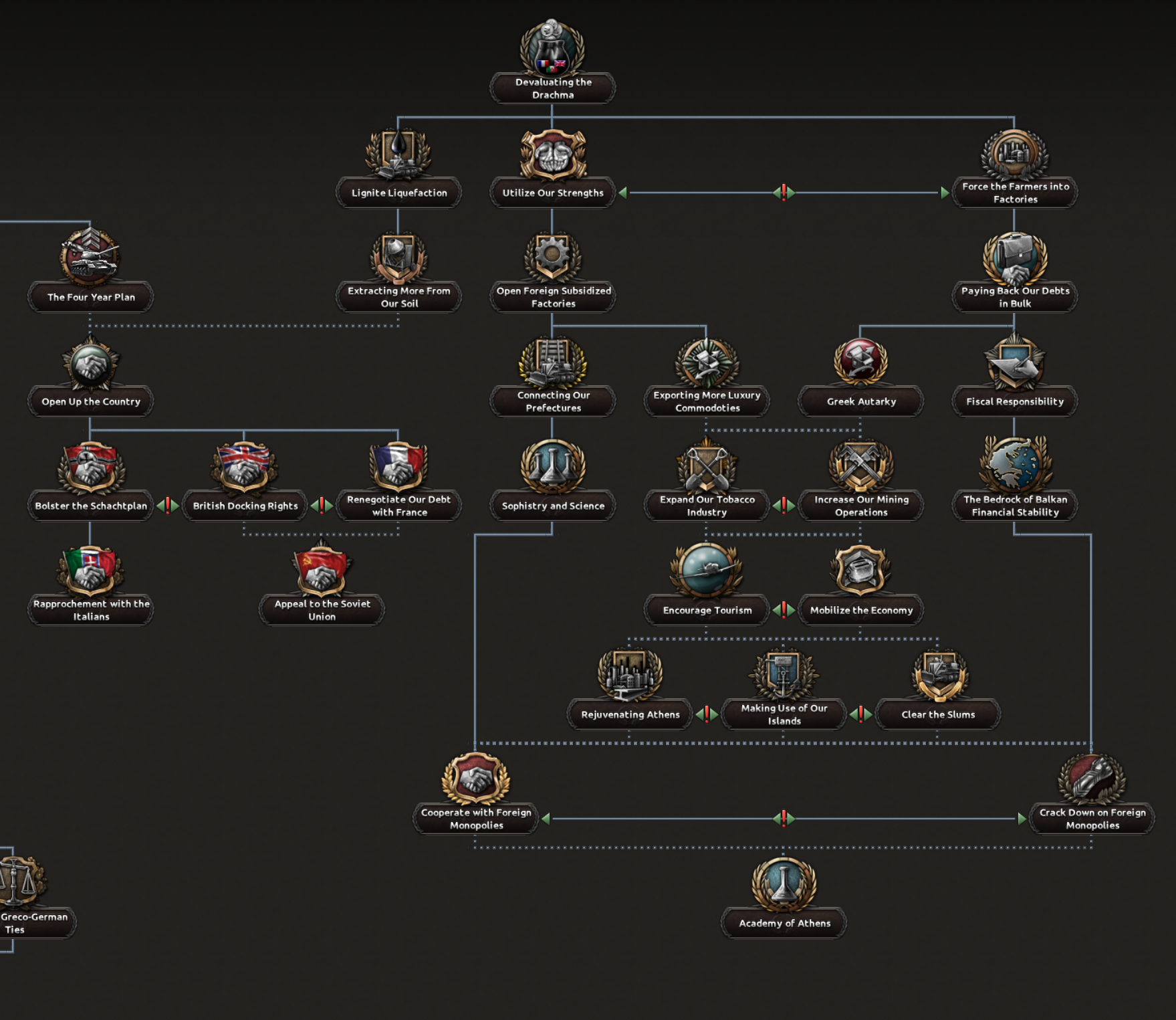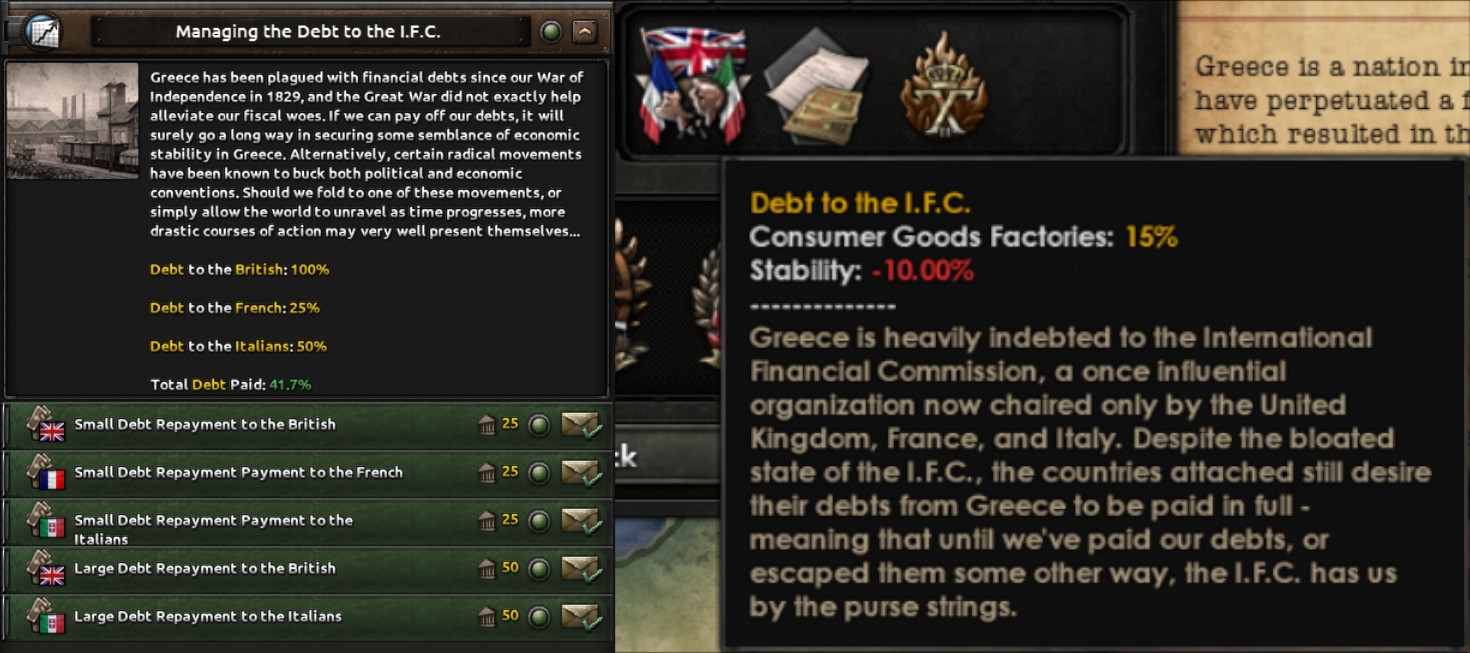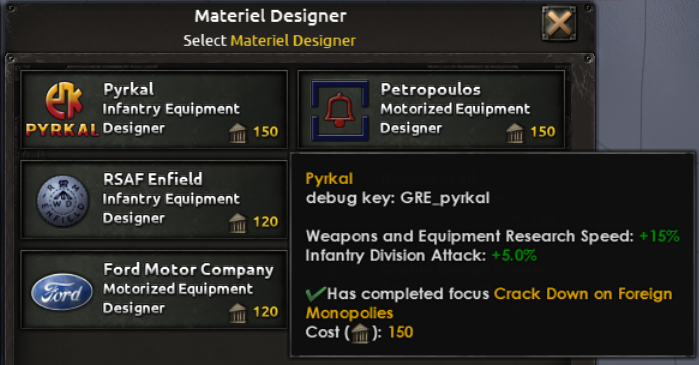Dev Diary: Bulgaria
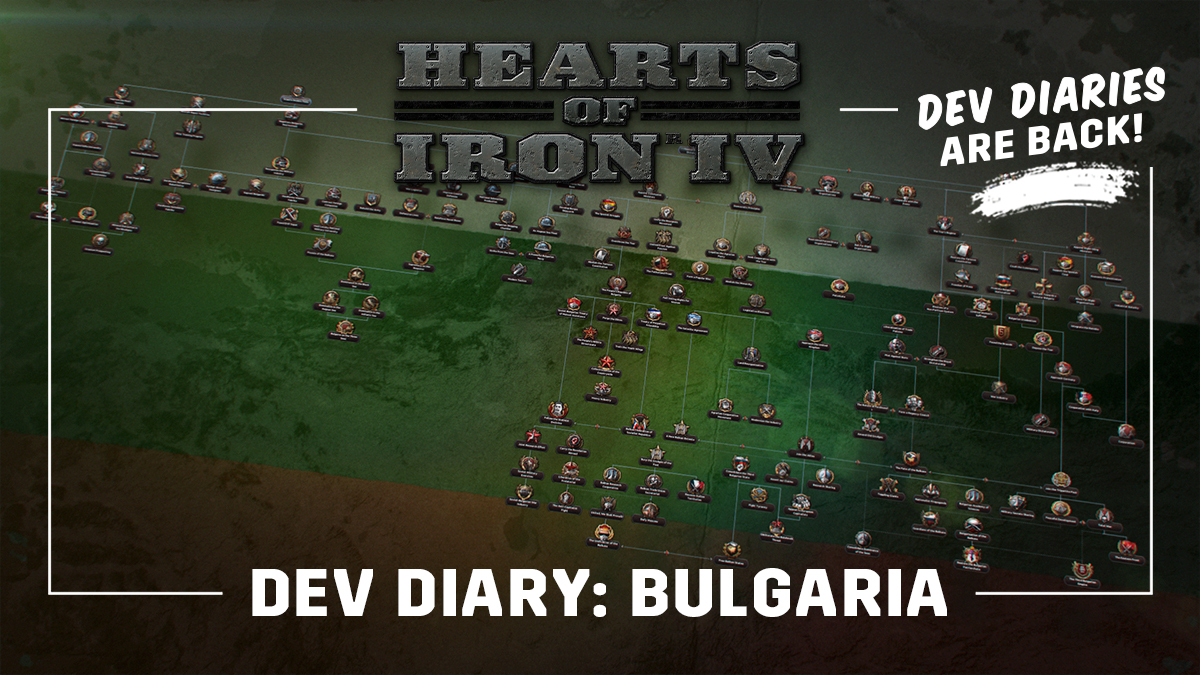
Здравейте всички - Hi everyone! And welcome to a new Hearts of Iron 4 Dev Diary!
Today we’ll be talking about the second country in the upcoming DLC, which I’ve been working on after La Resistance. A country that didn’t make it into DoD because by that time the team considered that they lacked the appropriate tools to depict both its multiple internal conflicts and its complex diplomatic relations. And as many of you had already guessed, the country in question is... Bulgaria!

As a defeated member of the Central Powers, Bulgaria suffered severe territorial losses, army restrictions and economic sanctions after the Great War, which led to a period of great instability and depression in the country.
In May 1934, the military organization Zveno carried out a coup d’etat and formed a new government, led by Kimon Georgiev, which dissolved the National Assembly, banned political parties and dealt a critical blow to the Macedonian revolutionary organization IMRO.
However, the Tsar forced Georgiev to resign in January 1935, appointed new puppet ministers and managed to seize full control over the country, imposing an authoritarian regime that benefited greatly from the measures imposed by the Zveno.
In 1936 Bulgarian society was split between different political and military organizations and social movements, most of them illegal thanks to the Zveno and the Tsar.
Bulgarian international relations were not in better shape, the IMRO, one of the most important Macedonian revolutionary organizations, carried out numerous fights and terrorist acts during the 1920s in both Yugoslavia and Greece, frequently operating from Bulgaria, and culminating in the 1930s with several assassinations including King Alexander I of Yugoslavia and the French Foreign Minister Louis Barthou. The actions taken by the Zveno to eradicate the IMRO helped improve Bulgaria’s image in the Balkans, but relations with its neighbors and with the countries of the Entente were still very cold.
In contrast, a very welcoming Third Reich helped Bulgaria overcome its sorry economic situation and seemed to offer a very promising future for Bulgaria....
Now let’s see how this turbulent country looks in HOI4 when you start a new game:
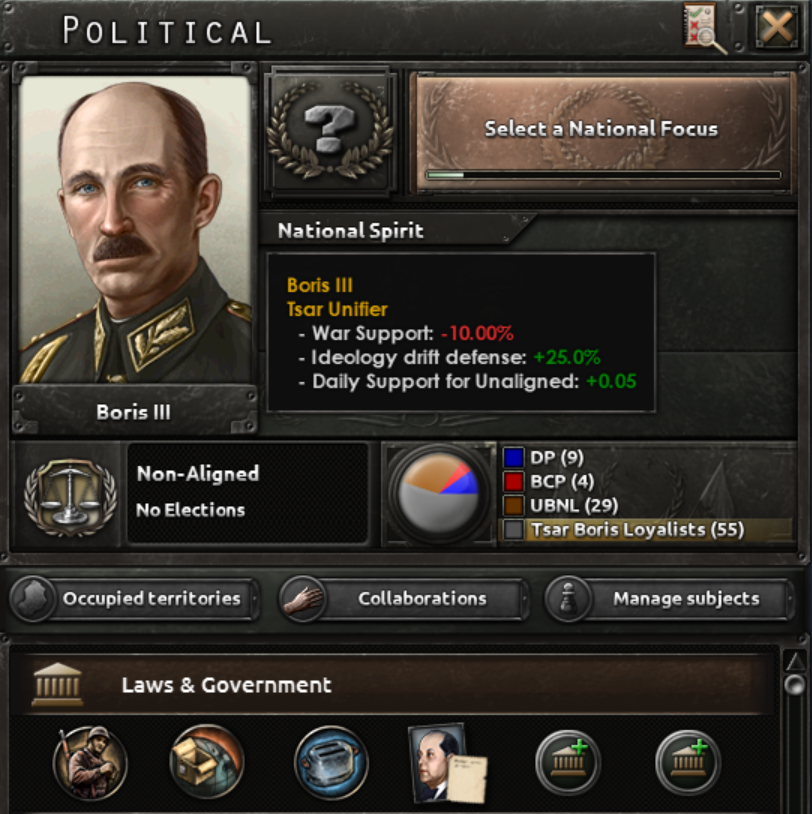
Bulgaria will start the game with Tsar Boris as the country leader, who will provide nice bonuses for non-aligned support and a flat penalty to war support (he seemed to be very reluctant to join the war after all, agreeing only to declare war on the allies later in 1941, probably believing that it would be nothing more than a symbolic act… How wrong he was!).
To be fair, the title ‘Tsar Unifier’ historically came with the Bulgarian occupation of previously lost territories in Greece, Yugoslavia and Romania, but I think the title fits pretty well with Boris’s modifiers.
Now let’s take a look at the Bulgarian National Spirits, from left to right:
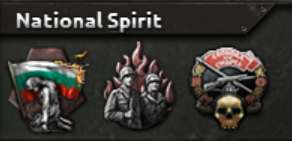

The Treaty of Neuilly-sur-Seine, signed after the Bulgarian defeat in the Great War, required Bulgaria to pay huge amounts in war reparations and forced the country to cede various territories, including western Thrace, cutting off Bulgarian access to the Aegean, and a significant area on the western border, very close to Sofia. It is no wonder why this treaty was known in Bulgaria as the Second National Catastrophe...
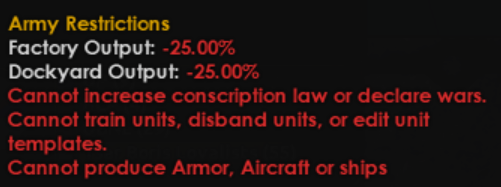
In addition to the sanctions above, the Treaty of Neuilly imposed very severe restrictions on the Bulgarian army, not only drastically limiting the amount of troops and forbidding the acquisition of modern equipment, but also prohibiting any military maneuvers and even stipulating the number of rifles that the Bulgarian security forces could use.
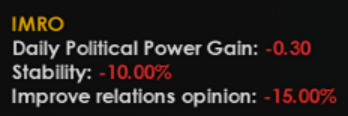
The Zveno dealt a major blow to the IMRO in 1934, but there were still many people that considered themselves Bulgarian Macedonians. In-game you can attempt to re-ignite this sentiment to your own benefit, or you can appease your neighbors and major European democracies by rooting out any remaining revolutionary cells in Bulgaria.
I know, there’s a lot of red in these three national spirits, not very inviting, huh...? Well fear not, for as you progress throughout the focus tree you will be provided with the tools you need to get rid of them, so we will be talking about them again later in the diary.
One last thing before we move on, did you notice that guy occupying a political advisor slot in the picture above? Well, since you will be seeing his face every time you start a new game with Bulgaria, let me introduce you to Georgi Kyoseivanov, Prime Minister of Bulgaria in 1936, who was not seen as a very competent leader, but more as a puppet of Tsar Boris, a prime minister who did not dare to defy the Tsar’s Regime and who was forced to resign and become ambassador to Switzerland in 1940. Even the Germans might ask you (as happened historically) to replace him with someone more suitable.
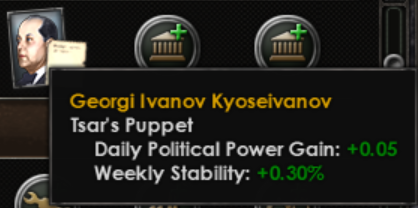
Looking at his modifiers, you can see a pretty poor PP bonus, and a pretty decent weekly stability boost. Do you remember that -0.30% stability from IMRO National Spirit? Well, so as long as you do not mess with the Tsar, you will have this guy working on countering that malus. But if you don’t plan on getting along with the Bulgarian monarchy, then you should plan ahead for this important stability boost that you will lose, especially if the IMRO penalty is still active.
Alright, now that we know about the situation in Bulgaria at the start of the game, let’s have our first glance at the new Focus Tree!
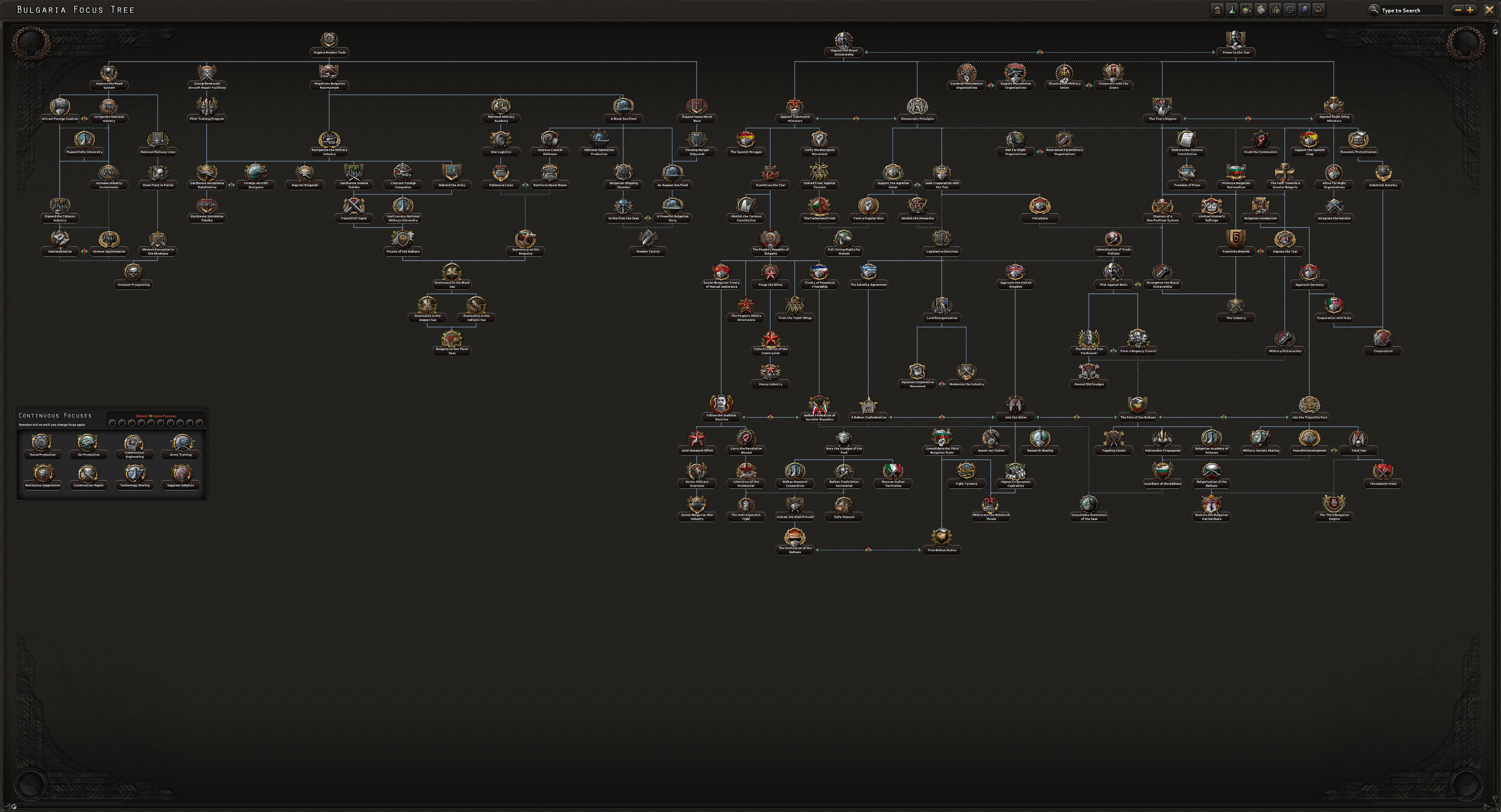
As you can see, there are two main branches, and as most of you have probably already guessed, the one on the left focuses on the industry and military, while the one on the right focuses on political affairs, but note that you will also find plenty of industrial, military and research stuff within the latter.
Let’s start with the industrial branch, on the left:
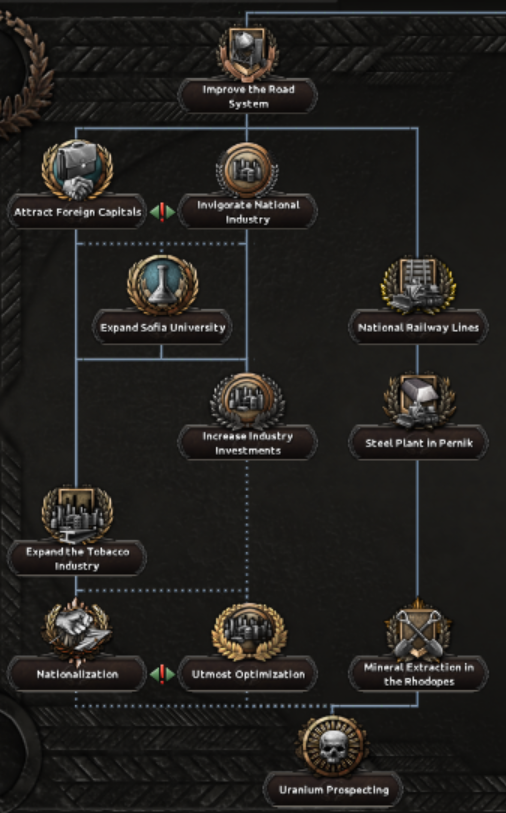
A very important decision that you’ll have to face when playing Bulgaria is how you want to develop your industry:
- Relying on foreign investors leads to faster industrialization, being able to ask certain major powers to make industrial investments and build some civilian factories in Bulgaria.
- Investing in your domestic industry, on the other hand, leads to slower industrialization, where you'll have to sacrifice some Consumer Goods to get progressively better bonuses in production and building speed, eventually removing that CG penalty and getting a fairly powerful national spirit by mid-to-late game.
Different industrial Designers will be unlocked based on your approach, national vs foreign. National designers are slightly weaker at first, but will be improved once you complete “Utmost Optimization” focus:

The small sub-branch to the right is more focused on getting some extra resources, a matter in which Bulgaria was really lacking at the time… I see you thinking “Uranium Prospecting… Bulgaria? What a waste!” Well, you may be right, but do not worry, if you feel that Bulgaria will not be able to get the most out of this focus, you can always sign a treaty with an allied major country granting them the associated National Spirit in exchange for a bonus in consumer goods, that’s what I call teamwork!
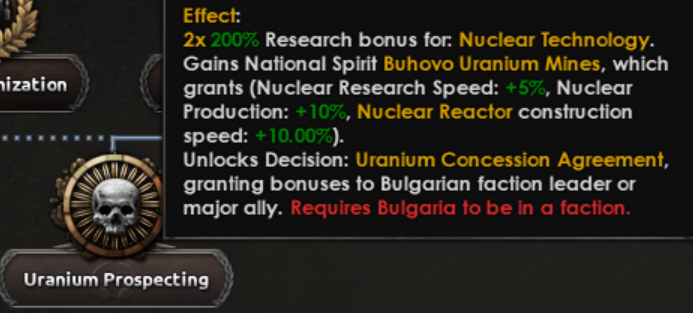
Then we have the military sub branches, within them you’ll find not only military factories and research bonuses, but powerful national spirits, valious XP and very appealing designers:
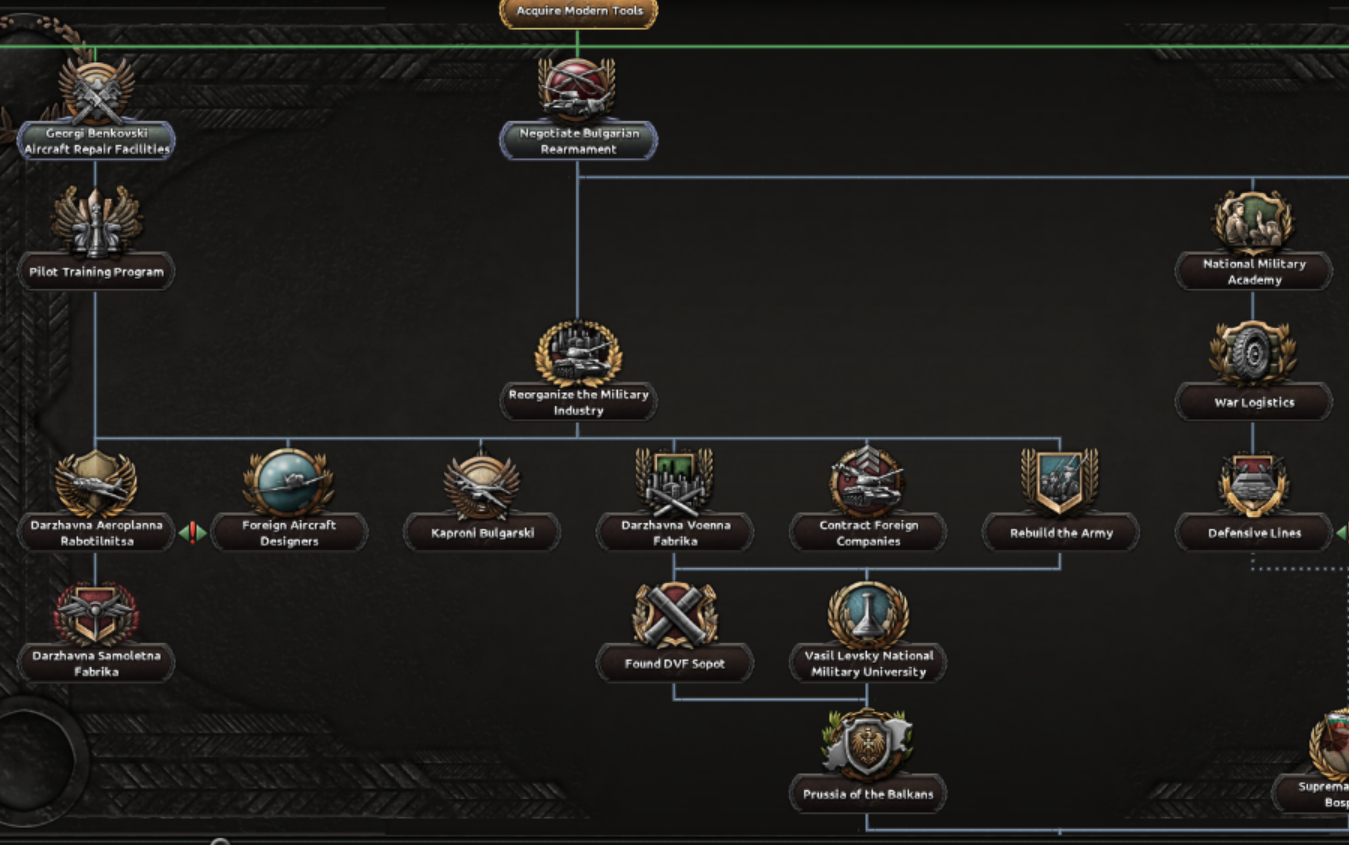
But before you can enjoy all that, you must get rid of the army restrictions imposed by the Treaty of Neuilly sur Seine, and how will you do that? Here is the answer:
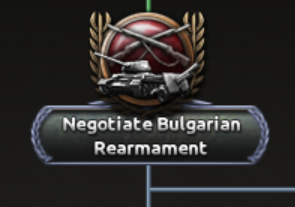
Historically, despite the fact that Bulgaria acquired some military equipment during the 30s, the country (unlike others…) generally complied with the military limitations imposed by the Treaty of Neuilly-sur-Seine. However, the Bulgarian government (or more accurately, governments) protested on several occasions and called for these restrictions to be lifted, arguing that the League of Nations could not protect Bulgaria against the rising powers and their threatening territorial ambitions in the Balkans… But it was not until Bulgaria strengthened diplomatic relations with its neighbors, and fearing that the Germans might exert too much influence over the country, that the United Kingdom eventually pressured France and the Balkan Entente to allow the Bulgarian rearmament.
In-game, this focus will unlock some decisions allowing you to pressure the British to lift your army restrictions. If you behave politely in your neighborhood, they may be more inclined to accept, but in case the British government does not listen to reason, you can always look for new friends elsewhere, friends who can back you up if you decide to flout the treaty.
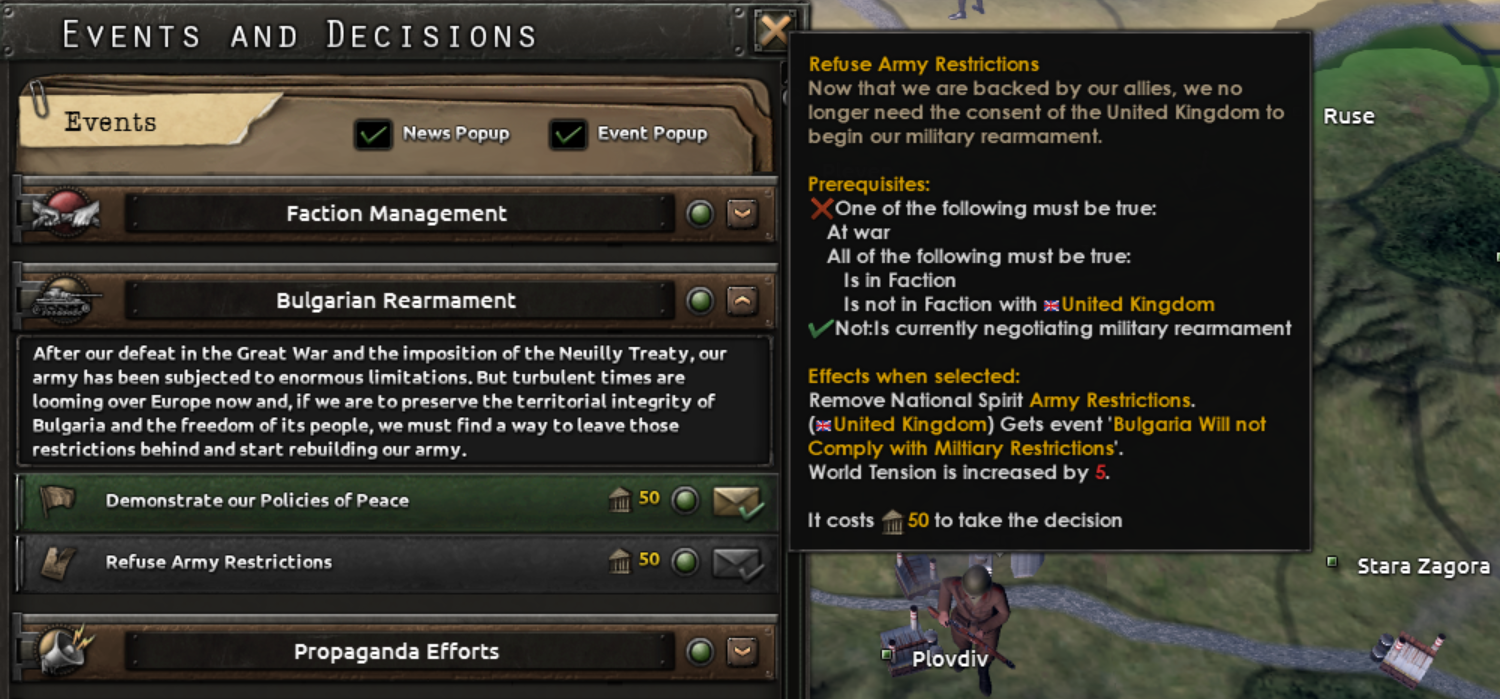
Once you have removed that disgusting National Spirit, you will be able to start working on your military industry for real.
Similar to the industrial branch, here you will be presented with foreign vs national designers, and likewise, national designers will be weaker at first, but will be upgraded once you complete “Prussia of the Balkans” focus, which by the way will also grant you one of the most powerful National Spirits:
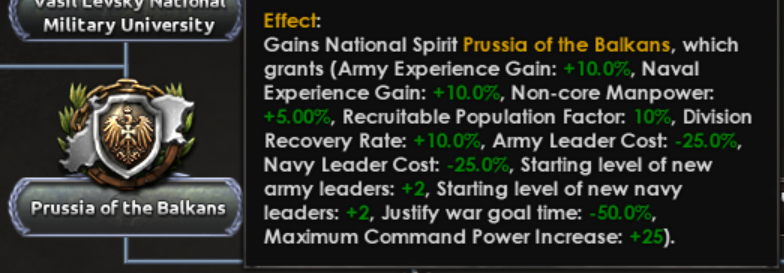
It may seem too powerful I know, but keep in mind that Bulgaria will have to spend some precious time (and PP) in dealing with those army restrictions before progressing on this branch and even start producing any big toys for the army!
Now let’s take a look at the Naval sub-branch:
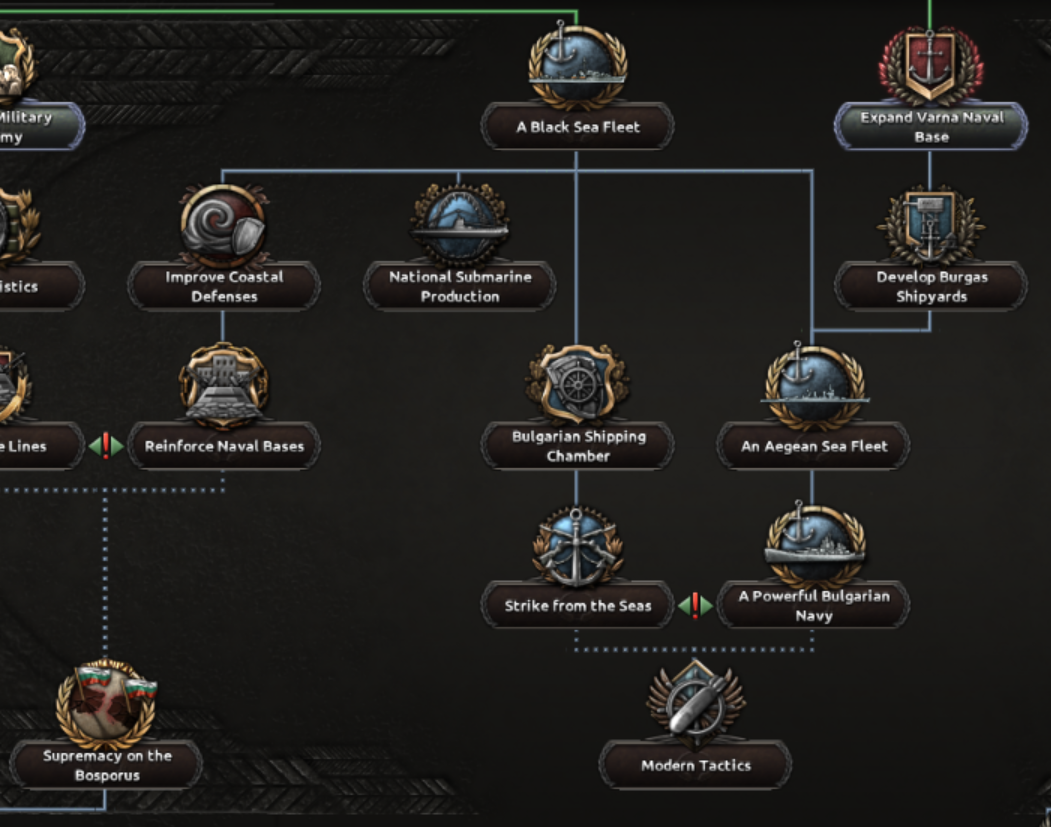
If Bulgaria wants to participate in naval conflicts, it must first develop its shipbuilding industry, which it can do in two stages, the first one leading to the construction of infrastructures and facilities to start the production of small warships and defend the Bulgarian coast in the Black Sea, and the second one focused on the expansion to the Aegean and the building of more powerful, capital ships.

This last part of the branch is kind of an experiment of mine. Once Bulgaria has developed its military industry and asserted its supremacy on the Bosporus (which is no small feat), the country will be in a position from which it could seek to consolidate its dominance in the various seas that, many centuries ago, bathed the coasts of the former Bulgarian Empires.
And we’ve made it to the political tree! Let’s start with the uppermost focuses, which will allow me to introduce you to the Bulgarian internal factions system:

Once you complete either “Power to the Tsar” or “Oppose the Royal Dictatorship” you will be presented with a new decision category where you can interact with the different Bulgarian internal factions represented in-game. These organizations were not actual political parties by 1936, since they were either banned political parties (Broad Socialists and Agrarian Union), a far-right paramilitary movement (National Social Movement) or a soon-to-be-dissolved political and military organization (Zveno).
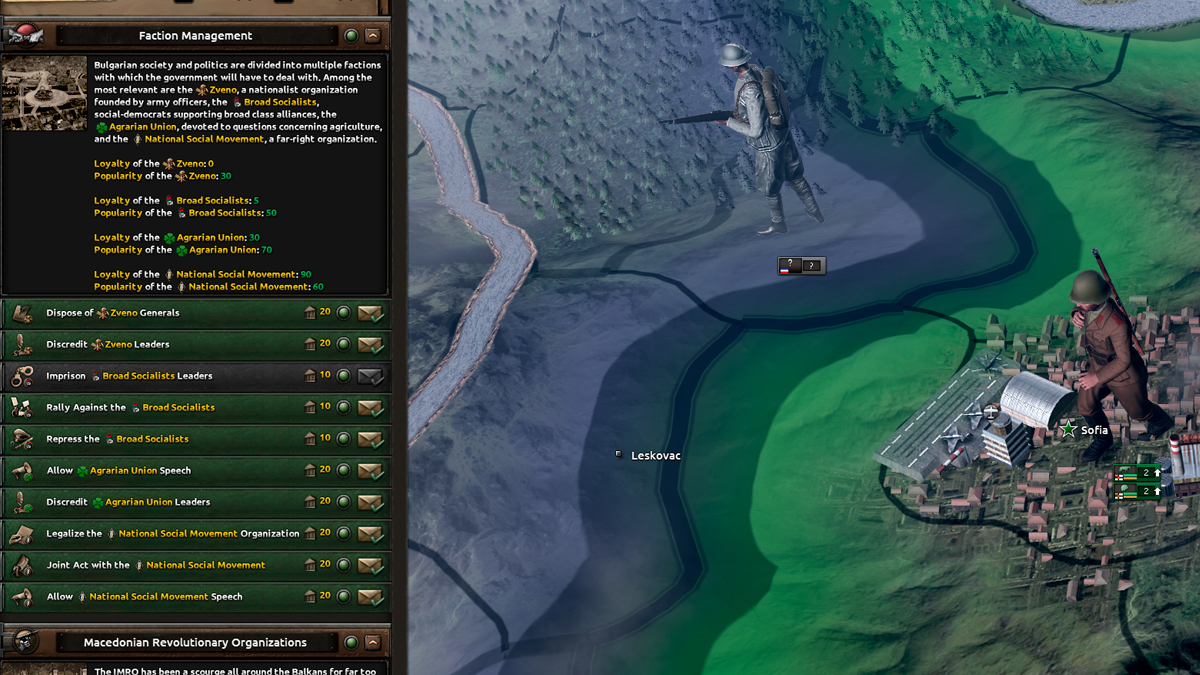
You can interact with these factions in two ways: Cooperation or Oppression, each of them unlocking a decision chain that will lead to either the integration of the faction into your government or its utter destruction.
If a faction has a low Loyalty value towards the government it will eventually cause some trouble by triggering a dissident event, ranging from industrial strikes and disturbing far-right demonstrations to the Zveno plotting against the government and leading (if not addressed in time) to a military coup. So if you are not planning on getting along with any of these factions, it could be worth rooting them out before they start making noise.
The oppression chain is the shortest but, apart from getting rid of a potential nuisance it does not offer any other big rewards.
The cooperation chain, while being more expensive and time-consuming to complete, will grant some benefits in the form of new advisors: Each faction has its own political advisor available only once you are about to integrate the organization into your government. Additionally, cooperating with the Zveno will unlock a handful of military advisors.

You will be able to cooperate or oppress these factions based on the Focus path you take, but save for a few exceptions (communists were probably not very eager to cooperate with the national social movement) you will be able to choose how to interact with each faction. The upper half of the political tree has plenty of focuses that (besides other effects) will have an impact on these factions as well as provide you with precious PP so that you can keep taking more decisions.
And before going through the different ideologies, let’s talk about the IMRO, because regardless of your ideology, you will have to deal with them eventually:
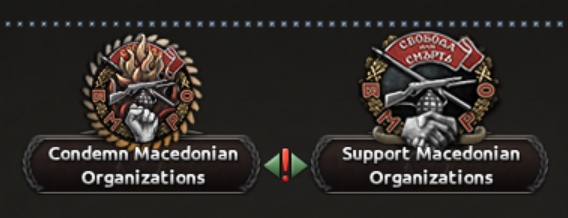
Publicly condemning the IMRO and investing resources in rooting out any remaining active cells in Bulgaria will help you in developing good diplomatic relations with the Allies and, of course, with your neighbors. Through a few decisions, you will be able to reduce the penalties of the IMRO National Spirit and eventually remove it completely.
If, on the contrary, you choose to support Macedonian Revolutionary Organizations in Bulgaria, you will be able to remove some of the penalties from IMRO National Spirit, but not all. However by cooperating with the IMRO you will increase Bulgarian popularity in Macedonian states, adding useful state modifiers that will take effect once you control them, and even creating resistance in Macedonian states controlled by others.

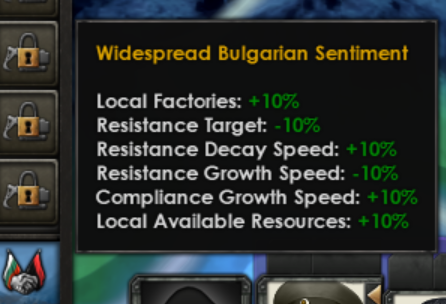
And we are finally ready to talk about the political branches now! Let’s start with the communists!
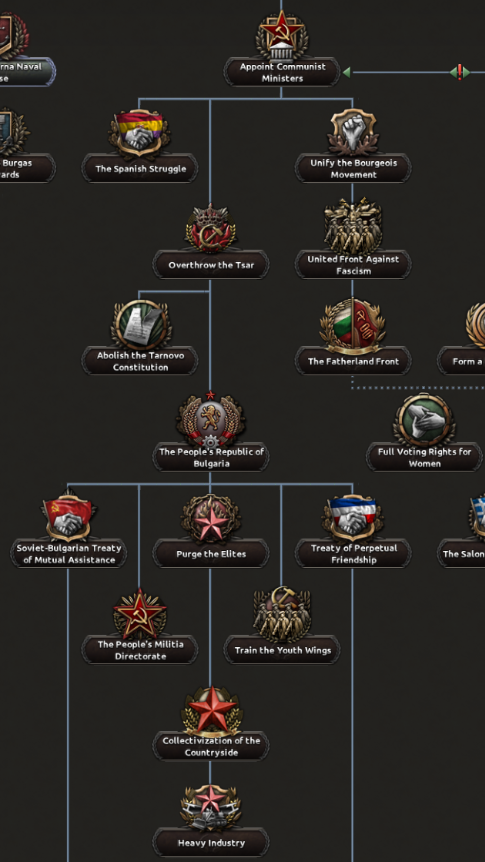
As I mentioned before, many of the focuses in the upper half of the branch will have a small impact on the internal factions and will provide you with some Political Power.
“Overthrow the Tsar” (just like its counterparts in other branches) can be taken fairly early, but be warned, if your stability is not high enough when you complete this focus, you might find yourself in the middle of a civil war, which might not be the ideal situation for Bulgaria once the major powers begin to make their moves in the Balkans…
In case of a peaceful abolition of the monarchy, the incompetent Georgi Kyoseivanov will be put in charge, so you might want to complete “The People’s Republic of Bulgaria” as soon as possible and form a communist government.
After that, you can approach the Soviet Union or Yugoslavia (or both of them) and attempt to sign a treaty with them. You will see similar focuses to approach different countries in the other branches, and as long as you don’t join a faction (or you join theirs) you will be able to approach both countries. Approaching major countries will also unlock decisions to purchase different types of military equipment from them.
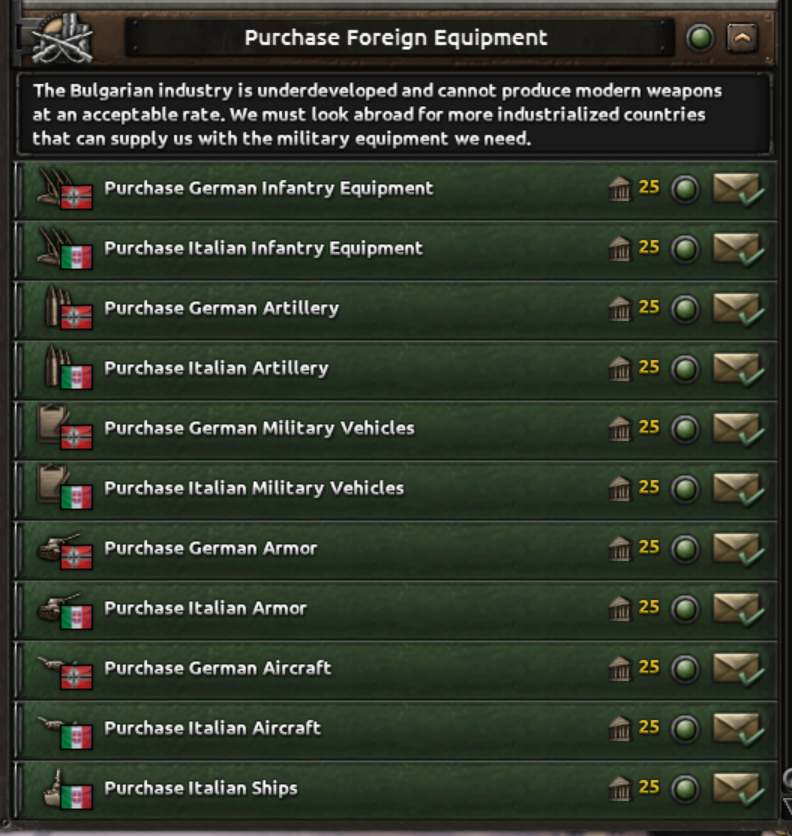
And back to the communist branch:

As you can see, approaching each of those countries leads to different “faction sub-branches”.
On the left we have the Stalinist branch, which is focused on cooperating with the Soviet Union, strengthening your army and your military industry and spreading the Stalinist doctrine within the Balkans.
On the right we have a branch mostly focused on the Balkans, leading to the formation of the Balkan Federation of Socialist Republics (an old project revisited several times, but never realized). Throughout this branch you will be able to influence Balkan countries and entice them to join your faction.

“Balkan Trade Union Secretariat” and “United, We Shall Prevail!” will grant economic and military boosts not only to Bulgaria, but to every other Balkan country in the faction too.
“The Unification of the Balkans” is the last step in the Balkan Federation Dream, unifying the territories and peoples of the Balkans under a centralized government, giving your Balkan allies the option to choose between being annexed by you or not (players can also choose to become puppets).
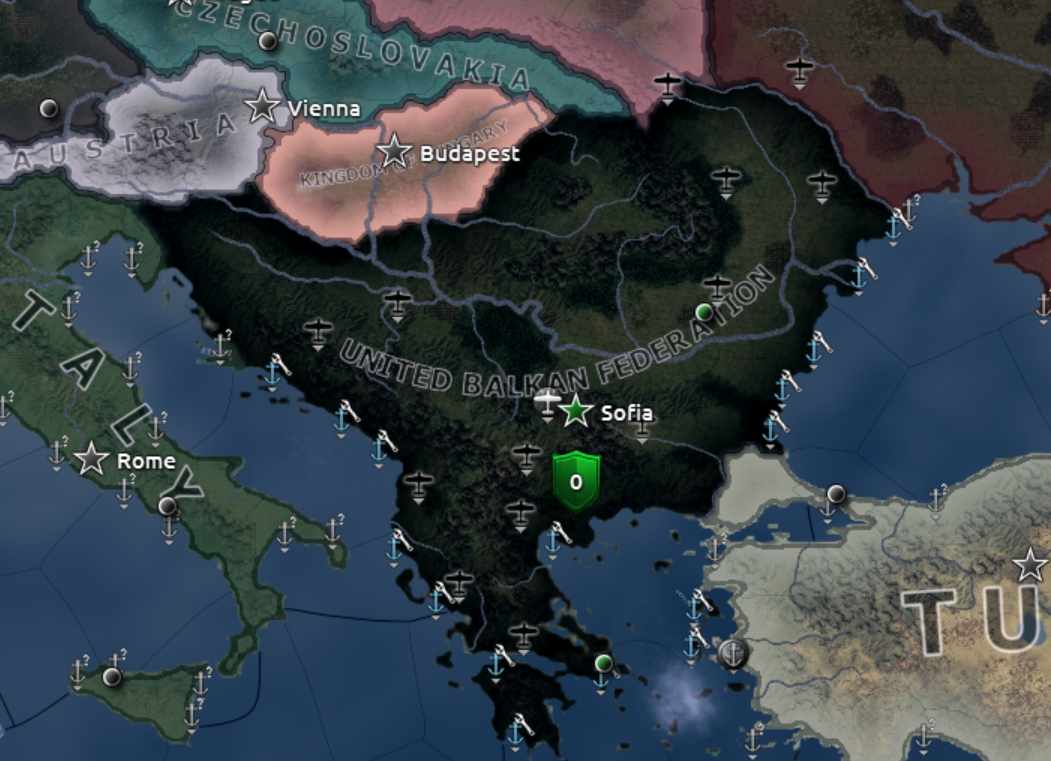
If you go through the Democratic Branch you will be able to choose to follow a more socialist approach, abolishing the Bulgarian monarchy and forming a popular Bloc, or you can seek the cooperation of the Tsar, following more liberal policies.

As you can see, even if you cooperate with the Tsar, you will be able to remove him from charge eventually, via “Plot Against Boris” focus, which will unlock some decisions leading to the assassination of the Tsar. We will talk a little bit more about this later.
Once you complete “Legislative Elections” and become Democratic, you can start working on developing good relations with Greece and the UK.
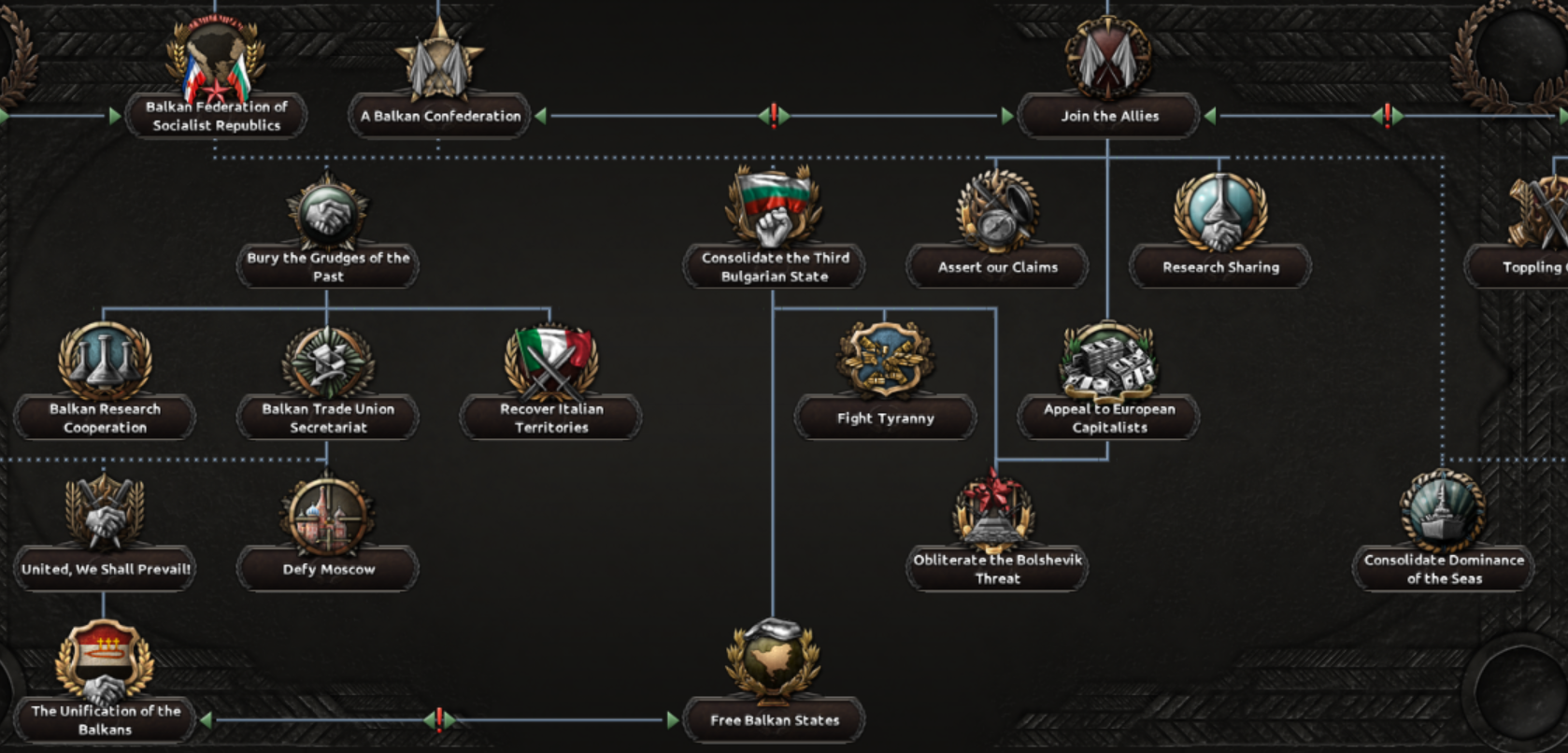
Similar to the communsit branch, approaching the major nation leads to joining its major faction, granting access to focuses offering, among other things, important military bonuses against Communist and Fascist nations.
“Assert our Claims” will grant you cores on any historically claimed state under your control (those former Bulgarian territories lost during the wars in the 1910s) and allow you to claim any neighboring enemy states.
And just like the communist branch, approaching the Balkan country (that being Greece) leads to the formation of a Balkan faction, this time the Balkan Confederation which, as you can see, shares its focuses with its communist counterpart. However, different decisions make for a slightly different way of influencing your neighbors. “Organize a Balkan Summit” will add a timed National Spirit to all Balkan countries, boosting democratic support and acceptance of democratic diplomacy. “Industrial Investments” and “Capital Injection” will boost democratic in the target country (and leave it more exposed to your ideology influence) while also providing them with some benefits.

Last of all, “Free Balkan States”, accessible from both democratic faction branches, may be an interesting alternative to “United Balkan Federation”, guaranteeing every independent democratic and non-aligned Balkan countries, creating a war goal against the rest, and providing Bulgaria with a powerful National Spirit that escalates based on the number of countries guaranteed.

Now let me to talk about both the Monarchist and Fascist branches together, since their paths are very intertwined:

One of your short-term goals when going through either of these paths will probably be to complete “Bulgarian Irredentism” as soon as possible, since this focus will ignite an irredentist sentiment in Bulgaria, replacing “Second National Catastrophe” spirit and turning its former weekly stability penalty into a weekly war support bonus:
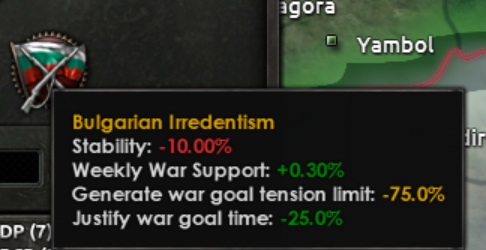
Fascist Bulgaria can choose between deposing the Tsar or forming a pro-fascist (yet monarchist) youth organization.
International relations will focus on Germany and Italy in both paths, while the monarchists will also be able to approach the UK and access the Allies branch.
Strengthening relations with Germany will unlock a decision to negotiate Bulgarian territorial claims in the Balkans with the Germans (yes, before actually choosing a side).
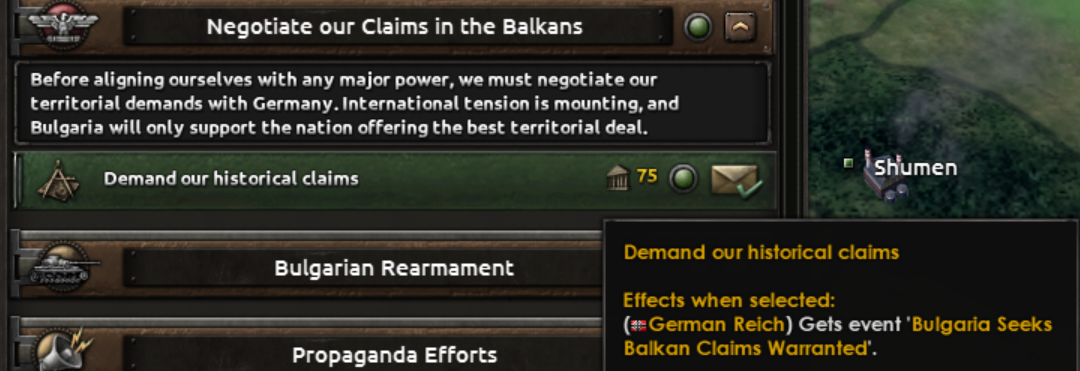
If Germany recognizes Bulgarian territorial claims, a state modifier will be applied to the appropriate states:
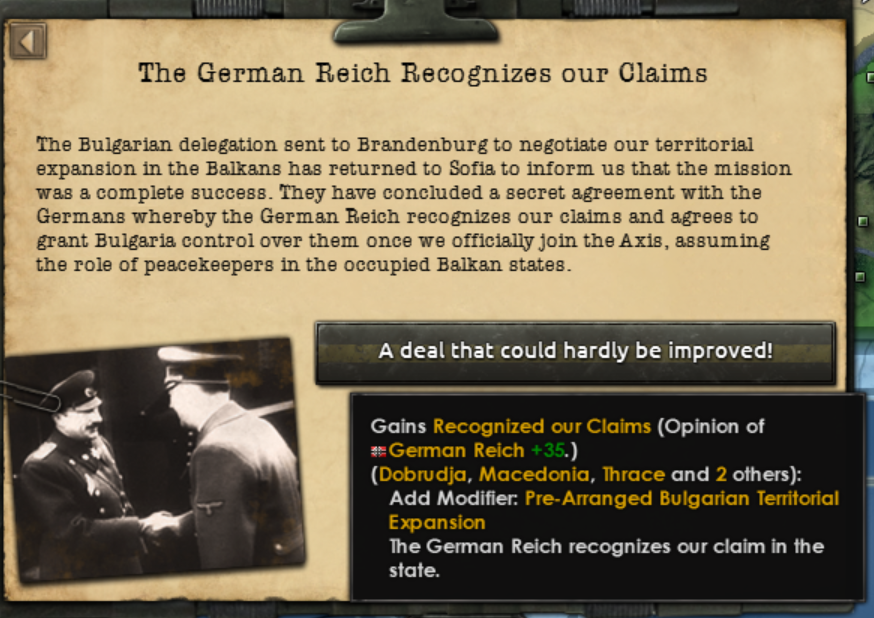
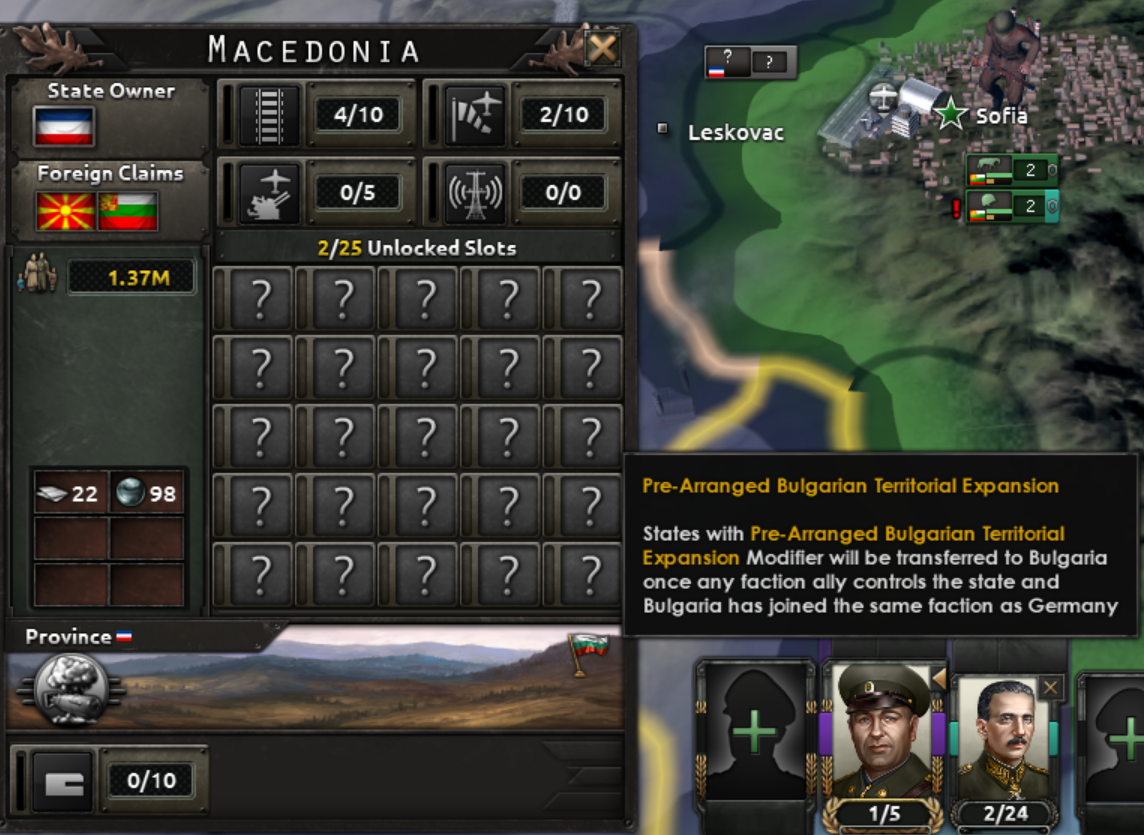
And yes, you can combine this with the state modifier provided by the IMRO, so that when Macedonian territories are transferred to Bulgaria, you will benefit from some nice resistance & compliance bonuses right away!
Back to “Plot Against Boris”, which is available through both the Democratic and Monarchist branches… But it will also be automatically completed if Boris dies of “natural causes” throughout the game, replacing its name and description to fit the new context, and allowing you to go further in that branch (assuming you haven’t already abolished the monarchy).


So once Boris is dead you can choose to form a Regency Council, and there can be several versions of it:
First of all, depending on your ideology, you can form a pro-allies (democratic), pro-axis (fascist) or independent (non-aligned) regency council.
Additionally, you will keep your former country leader as the head of the council, meaning that it will inherit his trait together with the Regency Council’s specific trait.
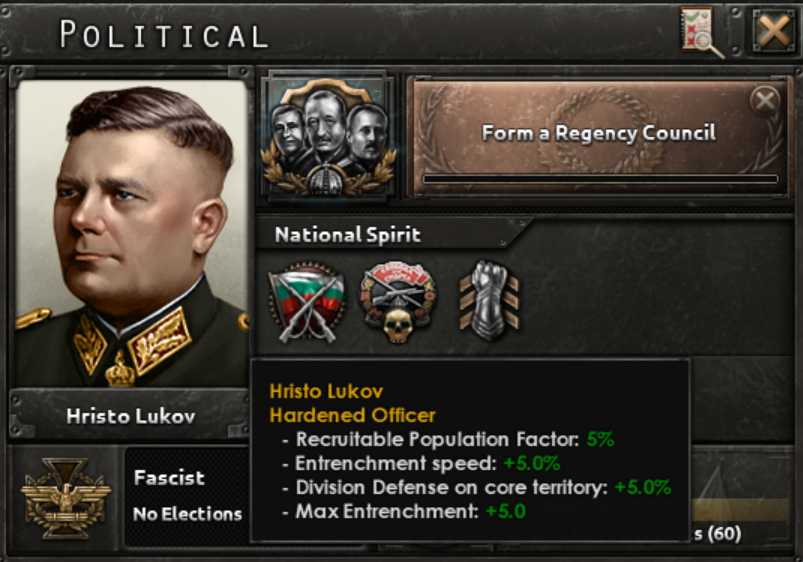
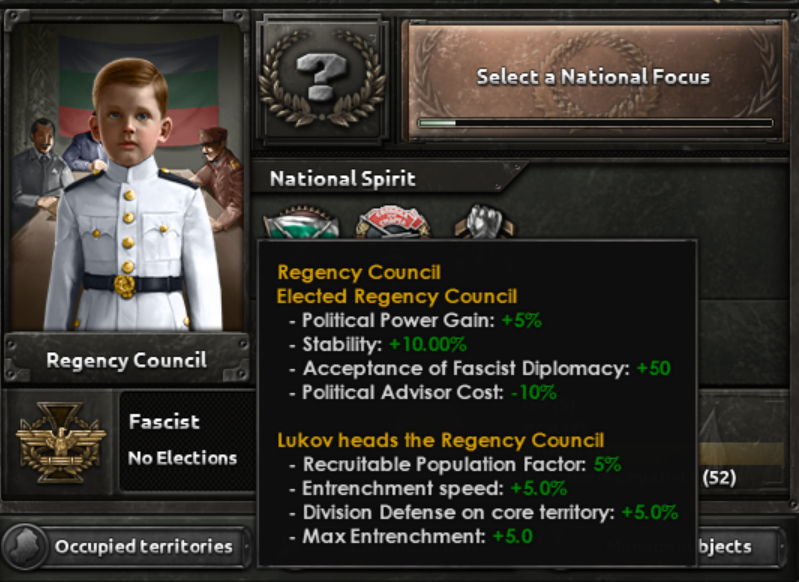
But maybe you think that the best person to rule Bulgaria is none other than Boris's father and former Tsar, Ferdinand I.
Ferdinand developed a great interest in Byzantium (as did his son) and it is said that he dreamed of the formation of a “New Byzantium”... Anyways, he definitely was a belligerent ruler who seeked to expand Bulgarian borders and who led the country into multiple wars during the 1910s (most of which didn’t end very well for his country), and was finally forced to abdicate in favor of his son after the defeat of Bulgaria in the Great War as part of the Central Powers.
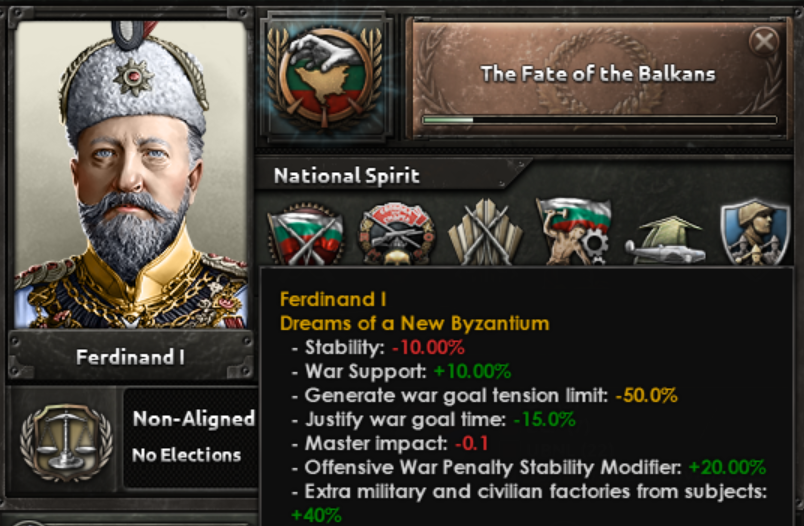
Regarding the factions available to both Monarchist and Fascist Bulgaria, let’s start talking about the Axis branch:
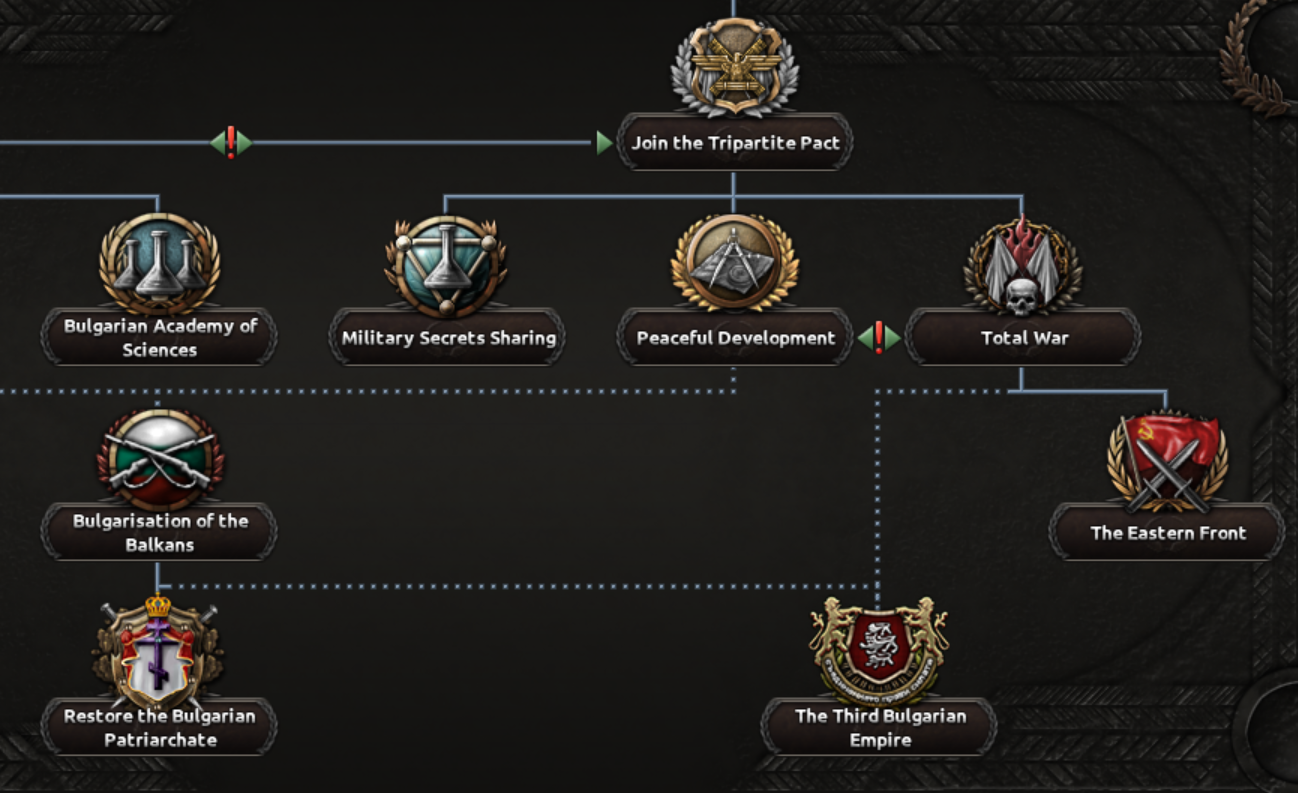
After Signing the Tripartite Pact you can choose the militaristic, aggressive “Total War” focus, by which you will join all wars against the enemies of your faction leader.
On the contrary, “Peaceful Development” leads to a more subtle path that will allow you to ask for control over neighboring Balkan States occupied by an ally.
In addition to this, “Bulgarisation of the Balkans” will grant you cores on certain historical claims if they are controlled by Bulgaria, and also unlock decisions to core other occupied Balkan states.
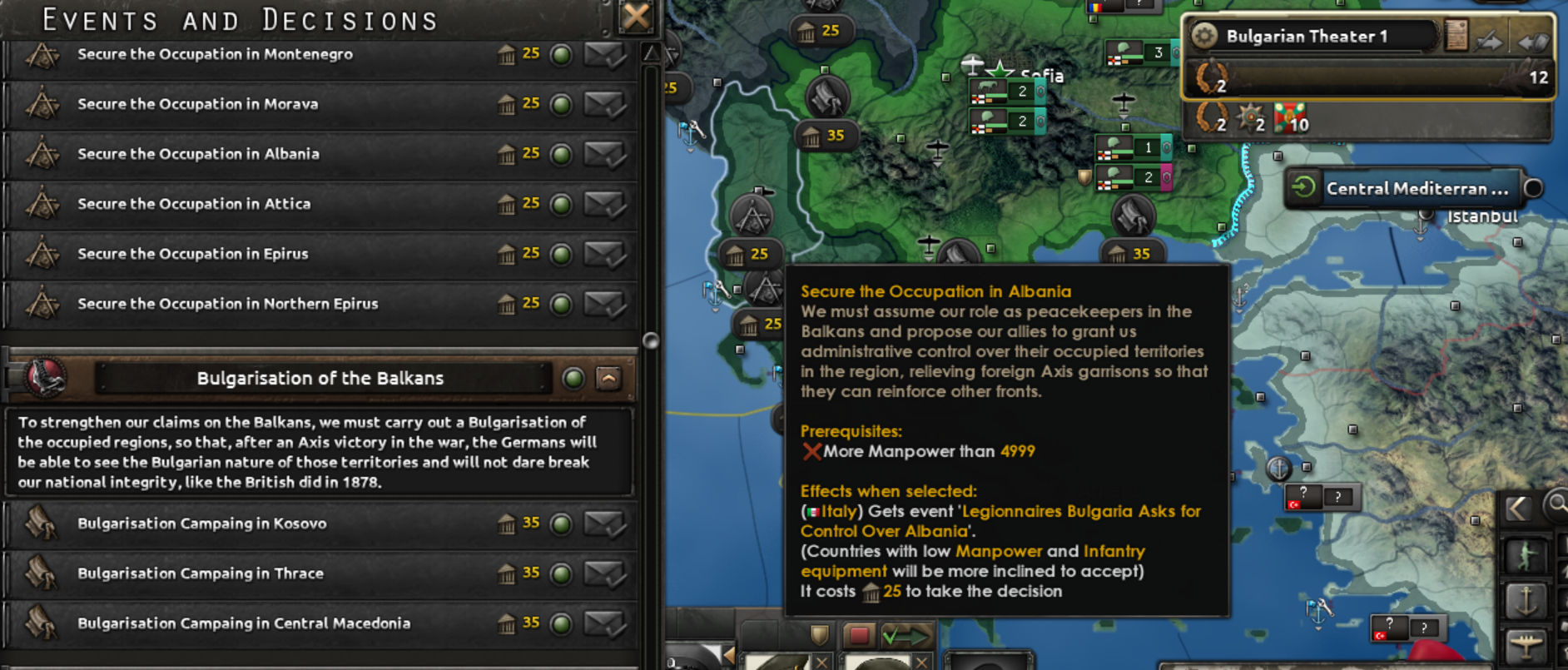
As some of you would have surely guessed, this is the Bulgarian historical path. After having signed the Tripartite Pact early in 1941, Bulgaria did not participate in the German invasion of Yugoslavia and Greece, but instead played the role of “peacekeepers”, taking control over certain pre-arranged territories and relieving Axis troops to be sent to other fronts, only declaring a symbolic war on the allies several months later. Bulgaria then started a Bulgarisation campaign in the occupation zones under its control, attempting to strengthen Bulgarian territorial claims on these regions after an Axis victory in the war.
As the final focuses on this branch, “Restore the Bulgarian Patriarchate” will grant powerful compliance, stability and political power bonuses while “Third Bulgarian Empire” will, among other things, set a new cosmetic tag for Bulgaria.

Last but not least, we have the “Fate of the Balkans” branch, available through not only the Fascist and Monarchist paths, but also the Democratic one (again, assuming you have not abolished the monarchy).

Completing “The Fate of the Balkans” focus will create a Bulgarian faction and unlock decisions to influence and coerce Balkan nations to join your alliance. Once a country has joined the faction, you can demand its submission and puppet them (the more you influence a country, the more likely it is to give in).
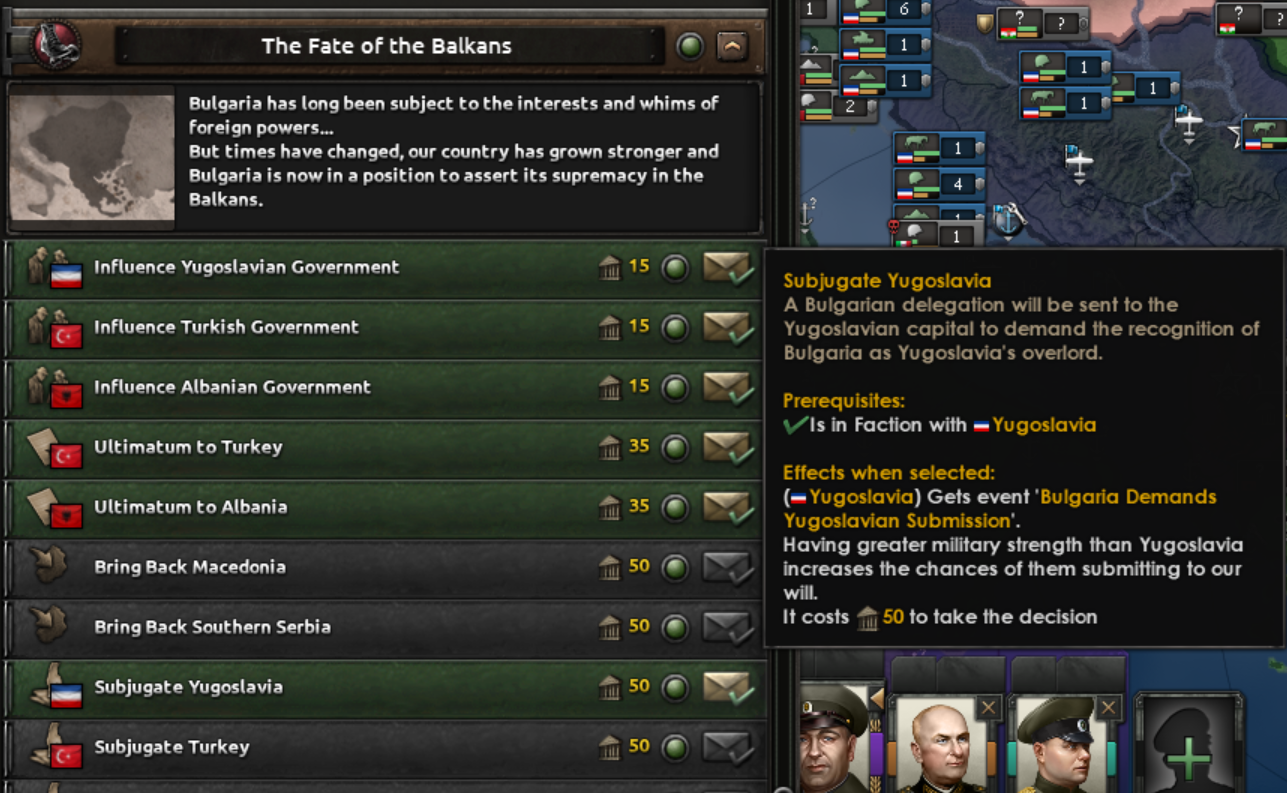
“Toppling Giants” will give you wargoals and significant attack and defense bonuses against major European neighbors, while “Guardians of the Balkans” will grant very nice combat bonuses on core territory and construction speed for military buildings not only to you, but also to your Balkan puppets, as a slightly weaker version.
As you can see, this is a fairly harsh and independent path focused on subjugating the Balkans and defending them from foreign invaders, which will not be easy, but I’m sure you’ll be up for a challenge!
Now allow to me give you one last piece of advice before saying goodbye: Choose your allies and your wars wisely when playing as Bulgaria, because if you or your faction mates aren’t doing very well in the wars, you can end up in a very delicate situation, just like the one faced by Bogdan Filov and his government in September 1944…

(By the way, big kudos to our freelance artist Indyclone for his magnificent event pictures!)
Aaaaand that was all from me! I hope you enjoyed the dev diary and make sure to stay tuned for the next one!




